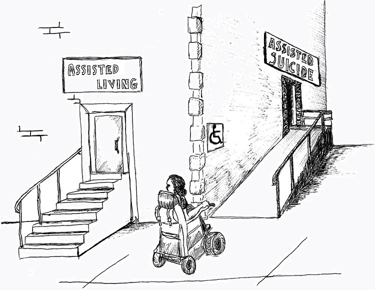New EAS Briefing Paper: Disability and Assisted Suicide: Elucidating Some Key Concerns (Professor Tim Stainton)
Read the Briefing PaperVery disturbing reports have recently come out about the euthanasia of persons with disabilities in Canada. The Associated Press (AP) reports a story about one man, Alan Nichols, who had a history of depression and other medical issues, none of which were life-threatening, and when the 61-year-old Canadian was hospitalised in June 2019 over fears he might be suicidal, he asked his brother to “bust him out” as soon as possible.
Within a month however, Nichols submitted a request to be euthanised and he was killed, despite concerns raised by his family and a nurse practitioner. His application for euthanasia listed only one health condition as the reason for his request to die: hearing loss. According to his brother, Gary Nichols: “Alan was basically put to death”.
Tragically, this story seems by means unique, and follows similar treatment of persons with disabilities in Belgium and the Netherlands. The article by the Associated Press quotes our Director, David Albert Jones, who notes that Canada prides itself on being liberal and accepting, “but what’s happening with euthanasia suggests there may be a darker side”. You can read the full article here.
In light of these disturbing revelations about the situation in Canada, the latest Briefing Paper in our euthanasia and assisted suicide (EAS) series could scarcely be more relevant – ‘Disability and Assisted Suicide: Elucidating Some Key Concerns’, by Professor Tim Stainton MSW PhD, Professor at the UBC Vancouver School of Social Work and Co-Director of the Centre for Inclusion and Citizenship.
In his paper, Prof. Stainton explores some of the background and context of concerns raised by disabled persons’ organisations about EAS, which they have long opposed, and examines a number of key issues and examples which suggest their fears are not unfounded, and how an ableist series of failures to properly include persons with disabilities – a lack of assisted living – pressures them into assisted suicide or euthanasia. The papers in our EAS series clarify the issues at stake in the social, political, and medical discussion, examining the definitions concerning, and practical consequences of legalising physician involvement in assisting a patient to end their own life, or directly causing their death.
You can read the full briefing paper series on its dedicated page on our website, here.
The cartoon below accompanying our new briefing is an adapted version of that created by Amy Hasbrouck, a Board Member of Not Dead Yet in the US, and Director of Toujours Vivant-Not Dead Yet, a project of the Council of Canadians with Disabilities to expand the reach of their Ending of Life Ethics Committee. The original picture may be found here.

Most recent
Press Release – Anscombe Bioethics Centre Launches ‘Advance Decisions and Ethical Choices’ Project
31 July 2025
The Anscombe Bioethics Centre is pleased to launch a new suite of resources on advance statements, l...
Statement on the Anscombe Bioethics Centre
31 July 2025
A statement from the Governing Body of the Anscombe Bioethics Centre and the Trustees of the Catholi...
Copyright Announcement
25 July 2025
Henceforth, all work which had Anscombe Centre or Linacre Centre copyright is now dedicated to the p...
Sincerest Thanks for Your Support
Staff are grateful to all those who sustained the Centre in the past by their prayers and the generous financial support from trusts, organisations, communities and especially from individual donors, including the core funding that came through the Day for Life fund and so from the generosity of many thousands of parishioners. We would finally like to acknowledge the support the Centre has received from the Catholic community in Ireland, especially during the pandemic when second collections were not possible.
We would like to emphasise that, though the Centre is now closed, these donations have not been wasted but have helped educate and support generations of conscientious healthcare professionals, clerics, and lay people over almost 50 years. This support has also helped prevent repeated attempts to legalise euthanasia or assisted suicide in Britain and Ireland from 1993 till the end of the Centre’s work on 31 July 2025.



